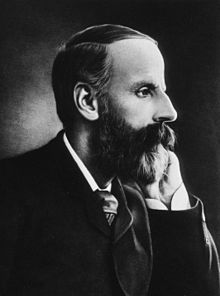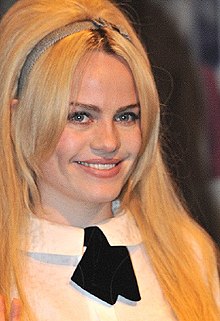제임스 워드(심리학자)
James Ward (psychologist)제임스 워드 | |
|---|---|
 | |
| 태어난 | )27 1843년 1월 |
| 죽은 | 1925년 3월 4일 (82) 영국 케임브리지 |
| 모교 | |
| 시대 | 현대 철학 |
| 지역 | 서양 철학 |
| 학교 | 영국의 이상주의[1] |
| 기관 | 케임브리지 트리니티 칼리지 |
| 어드바이저 | 헤르만 로체 |
| 저명한 학생 | |
주된 관심사 | 심리철학 |
주목할 만한 아이디어 | 범심리학 |
영향 | |
영향받은 | |
제임스 워드 FBA(James Ward FBA, 1843년 1월 27일 ~ 1925년 3월 4일)는 영국의 심리학자 겸 철학가였다.[1] 그는 케임브리지 사도였다.
인생
워드는 킹스턴 온 헐에서 9명의 아이들 중 장남으로 태어났다. 그의 아버지는 성공한 상인이었다. 워드는 리버풀 인스티튜트와 모스틴 하우스에서 교육을 받았으나, 아버지가 파산하면서 정식 학교 교육은 끝났다.
4년 동안 리버풀 건축가의 도제가 된 워드는 그리스어와 논리를 공부했고 주일학교 교사였다. 1863년, 그는 조합원 사역을 위해 훈련하기 위해 버밍엄 근처의 스프링 힐 대학에 입학했다. [2] 괴팍하고 가난한 학생인 그는 1869년까지 스프링 힐에 남아 신학 연구와 런던 대학교 학사 학위를 취득했다.
1869년–1870년 워드는 독일로 장학금을 받아 베를린에서 이삭 도머의 강의를 들은 뒤 괴팅겐으로 건너가 헤르만 로체 밑에서 공부했다. 그가 영국으로 돌아오자, 그의 신학적 자유주의가 불행하게도 그의 신도들을 적대시했던 케임브리지의 에마뉘엘 회교회에서 목사가 되었다. 워드의 곤경에 동정심을 느낀 헨리 시드윅은 워드가 캠브리지 대학에 입학하도록 격려했다. 처음에 대학 출신이 아닌 학생이었던 워드는 1873년에 트리니티 칼리지의 장학금을 받았고, 1874년에 도덕 과학 트리포스의 제1학급을 획득했다.[3]
With a dissertation entitled The Relation of Physiology to Psychology, Ward won a Trinity fellowship in 1875. Some of this work, An interpretation of Fechner's Law, was published in the first volume of the new journal Mind (1876).
For the rest of his life, the Dictionary of National Biography reports that he
held himself aloof from all institutional religion; but he did not tend towards secularism or even agnosticism; his early belief in spiritual values and his respect for all sincere religion never left him.
During 1876–1877 he returned to Germany, studying in Carl Ludwig's Leipzig physiological institute. Back in Cambridge, Ward continued physiological research under Michael Foster, publishing a pair of physiological papers in 1879 and 1880.
However, from 1880 onwards Ward moved away from physiology to psychology. His article Psychology for the ninth edition of the Encyclopædia Britannica was enormously influential – criticising associationist psychology with an emphasis upon the mind's active attention to the world.
He was elected to the new Chair of Mental Philosophy and Logic in 1897 and his students included G. E. Moore, Bertrand Russell,[1] Sir Mohammed Iqbal and George Stout.[4]
He was president of the Aristotelian Society from 1919 to 1920; his wife Mary (née Martin) was a lecturer in moral sciences at Newnham College, a suffragist and a member of the Ladies Dining Society in Cambridge.
Ward died in Cambridge, and was cremated at Cambridge Crematorium.
Philosophical work
Ward defended a philosophy of panpsychism based on his research in physiology and psychology which he defined as a "spiritualistic monism".[5][6] In his Gifford Lectures and his book Naturalism and Agnosticism (1899) he argued against materialism and dualism and supported a form of panpsychism where reality consists in a plurality of centers of activity.[7] Ward's philosophical views have a close affinity to the pluralistic idealism of Gottfried Wilhelm Leibniz.[8][9] Ward had believed that the universe is composed of "psychic monads" of different levels, interacting for mutual self- betterment.[10] His theological views have been described by some as a "personal panentheism".[11]
참조
- ^ a b c 제임스 워드 (스탠포드 철학 백과사전)
- ^ 치솔름 1911.
- ^ "Ward, James (WRT872J)". A Cambridge Alumni Database. University of Cambridge.
- ^ "Stout, George, Frederick (STT879GF)". A Cambridge Alumni Database. University of Cambridge.
- ^ Vergilius Ture Anselm Ferm 1968년 철학적 체계 Littlefield, Adams, Littlefield의 역사
- ^ 제임스 워드 끝의 영역: 또는 다원주의와 Theism Reprint Edition, 2011, 캠브리지 대학 출판부, 페이지 13 ISBN 0521235502
- ^ 제임스 워드 자연주의와 애그노스티즘 뉴욕: 맥밀란 회사, 1899년
- ^ Ninian Smart; John Clayton (1 July 1988). Nineteenth-Century Religious Thought in the West. Cambridge University Press. p. 297. ISBN 978-0-521-35965-8. Retrieved 7 April 2012.
- ^ 뉴 케임브리지 현대사: 폭력의 시대, 1898–1945년 데이비드 톰슨 대학 출판부 편집, 1960년 페이지 135
- ^ 휴 조셉 탈론 영국과 미국의 이상주의 1939, 페이지 118에 나타난 자아 개념
- ^ John W. Cooper (2006). Panentheism, the Other God of the Philosophers: From Plato to the Present. Baker Academic. p. 133. ISBN 978-0-8010-2724-6. Retrieved 7 April 2012.
- 귀인
- Chisholm, Hugh, ed. (1911). . Encyclopædia Britannica (11th ed.). Cambridge University Press.
외부 링크
| Wikisource는 다음과 같은 원작을 가지고 있다. 제임스 워드 |
- 브리태니커 백과사전, 제9판, 제 XX권(1886)의 "심리학".


